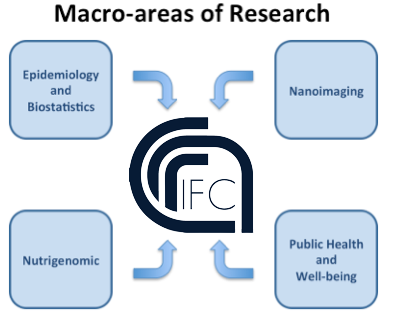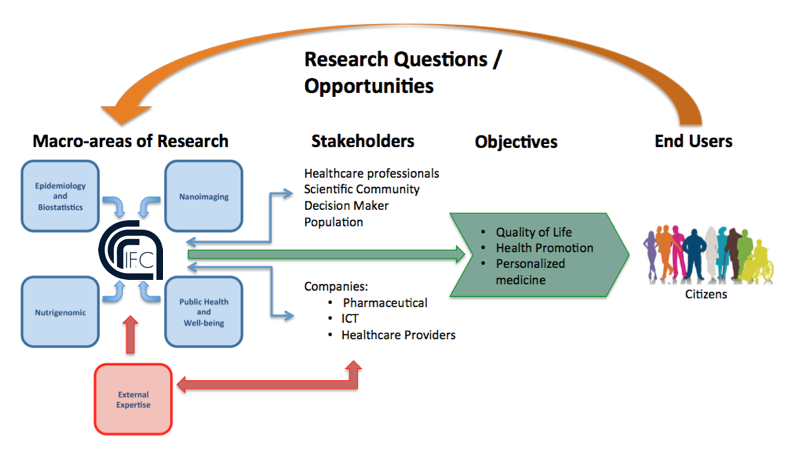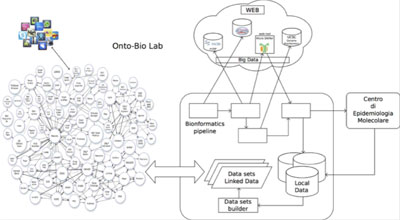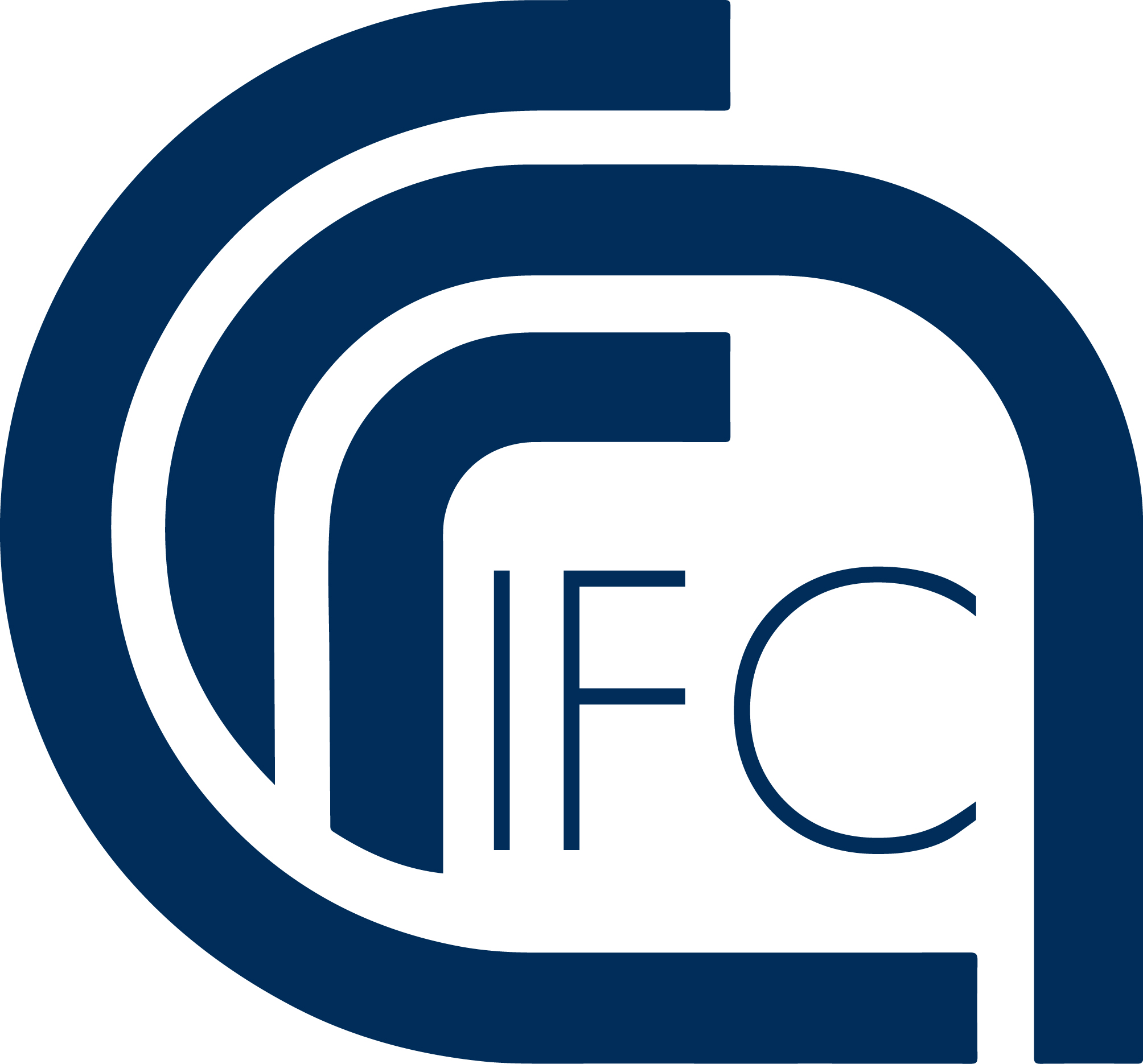Lecce
The Research Unit of Lecce of the Institute of Clinical Physiology has been constituted in 1993 with the aim of performing biomedical research and promoting research in South Italy. These objectives are pursued by means of a fruitful collaboration with other research institutions, public entities and private sector. The Research Unit of Lecce is involved in 4 macro-areas of research: Epidemiology and biostatistics, Nanoimaging, Nutrigenomic, and Public Health and Well-being. The Research Unit comprises 22 working persons (14 researchers, 5 technicians and 3 Associates). Junior researchers complement the research groups. The Head of the Research Unit of Lecce is Dr. Carlo Giacomo LEO.

Research activities
We specifically focus on health issues critically emerging in the local area. As a common and transversal methodological approach, all the four research areas cultivate a thorough analysis of the local context and National Health Systems, as well as the constant comparison with the best policies and practices on health promotion, prevention, diagnosis, treatment, rehabilitation and follow-up. Our research activities are characterised by an interdisciplinary approach and by a constant collaboration and networking with researchers from other national and international institutions.

Four Macro-Areas of Research
Epidemiology and biostatistics
- Environmental and health in high risk environmental areas;
- Advers effects of exposure to ionizing radiation;
- Science and society.
Nanoimaging
- Nanoimaging and Nanomedicine: development of new methodologies for non-ionizing molecular imaging through nanosized contrast agents for Targeting, Drug delivery and Theranostics;
- Advanced processing of biomedical signals and diagnostic images employing both manual experimental approaches and automated industry-like ones;
- Tissue characterization through radiofrequency signal processing combined with echographic acquisitions;
- Ultrasound Densitometry: research and development of new ultrasound methods for early osteoporosis diagnosis;
- Non-invasive echographic monitoring of Pregnancy and Childbirth Labor: design and implementation of quantitative approaches for early diagnosis of Fetal Malformations and automatic monitoring of Childbirth Labor.
Nutrigenomic
- Study of risk factors (obesity and metabolic syndrome) and the pathogenesis of atherosclerosis for the identification of new therapeutic targets of drugs (pharmacogenomics) and nutrients (nutrigenomics);
- Nutraceuticals and Health Promotion: Analysis of healthful specific Nutraceuticals (mono and polyunsaturated fatty acids, phenolic compounds) present in typical foods of the Mediteranean Diet. Analysis of anti-angiogenic, anti-inflammatory, anti-proteolytic and anti-obesity properties.
- Study of the effects of environmental contaminants and dietary habits in the pathogenesis of preterm birth;
- Study of cardiovascular risk and the influence of diet in chronic obstructive pulmonary disease.
- Nutritional intervention as a strategy to modulate the toxicity of environmental pollutants: the role of n-3 fatty acids and polyphenols.
- Regenerative medicine: use of endothelial progenitor cells (EPC) in the therapeutic vascularization.
Public Health and Well-being
- Integration of care pathways, principally in chronic diseases, economic evaluation of alternative health programs and modelling of different scenarios to provide a technical support for transparent decision making.
- In silico analysis of genetic factors contributing to the expression of the pathological phenotype.
- Population-based research (observational and interventional studies) on disease aetiology, risk factors, surveillance, survivorship and prevention of chronic-degenerative and infectious diseases.
- Research about new diagnosis parameters, and new therapy evaluation; genotoxic effects of pollutants and chemical and physical endocrine disruptors.
- Patient-physician communication, informed consent, health literacy and numeracy, risk communication and ionizing radiation, eLearning and knowledge management.
Laboratories
Nanoimaging

The Nanoimaging Ultrasound Lab is equipped with the following experimental units for nanomedicine studies and medical imaging with molecular and cellular sensitivity based on functionalized nanosystems for selective targeting:
- EXPERIMENTAL ULTRASOUND UNIT FOR IN VITRO TESTS ON PHANTOMS AND LABORATORY MODELS: pairs of single-element ultrasound transducers; pulser-receivers; programmable function generators; digital oscilloscopes; data acquisition boards; Multisizer III Coulter Counter; hydrophones; RF amplifiers; gear, peristaltic, and infusion pumps; ultrasound flussometer; pressure transducer; ultrasonic bath; thermostatic bath.
- CLINICAL IMAGING UNIT: 3D echograph with 5 dedicated probes; 2D digital echographs with linear, convex, phased array, transvaginal/transrectal probes; dedicated platforms for RF signal extraction from echographic devices; Doppler Multigate board; electrocardiographs; workstations for biomedical image and signal processing.
- UNIT OF MOLECULAR BIOLOGY STUDIES FOR ADVANCED IMAGING APPLICATIONS: all the necessary equipment to carry out experimental studies on primary cell cultures and cell lines, with cellular biology, biochemistry and molecular biology techniques
Vascular Biology, Nutrigenomics and Pharmacogenomics Laboratory

The Vascular Biology, Nutrigenomics and Pharmacogenomics Laboratory of the Institute of Clinical Physiology, Lecce Unit, is headquartered at the Ecotekne University Campus, in Lecce, Italy. It is equipped with all the instrumentations and resources necessary to human and animal cell cultures and to cellular, biochemical and molecular analyses in experimental animal models and in humans (laminar flow hoods, CO2 incubators, optical and fluorescence inverted microscopes with integrated image capture and processing system, microplate reader, luminometer, termalcycler, centrifuges and microcentrifuges, complete laminar flow PCR workstation, gel-electrophoresis apparatus).
Basic biomedical research is carried out in in vitro and ex vivo models of inflammation and atherosclerosis represented by cultured endothelial cells, monocytes/macrophages, vascular smooth muscle cells, adipocytes, all cell types crucial to the development of atherosclerosis and its vascular complications. These cell model systems are a powerful research tool allowing the measurement, in rigorously controlled and standardized conditions, of cell activation associated with the development of cardiovascular diseases. In addition, they allow to establish whether and how external interventions modulate responses to specific triggers as well as to identify new triggers of inflammatory vascular diseases. Moreover, animal models of atherosclerosis and metabolic diseases are employed to evaluate the effects of external interventions on risk factor profile and disease progression and to define mechanistic pathways.
Through the application of high-throughput genomics technology the interactions between nutrients, genes and health are studied to isolate and exploit nutritional compounds able to curb disease progression by modulating the expression and function of disease genes. Another research purpose is the study of the role of genetic variation to explain individual differences in responses to nutrition, which underlies in part the susceptibility for nutrition-related disorders, with the ultimate goal of personalized nutrition.
Onto-Bio Lab

Activities in Health Informatics and Bioinformatics are performed, in collaboration with the Genetic and Biomolecular Epidemiology Unit, at the Onto-Bio Lab, a ubiquitous research laboratory led by our group which focuses on the integration, management and usability of data by exploiting the ubiquitous paradigm. Hardware (server and storage) is physically distributed on the different units of our Institute, while software and databases (big or linked data) are managed locally, or dynamically queried and retrieved from Internet.
Staff
|
Head Researcher |
||
|
Dott. Carlo Giacomo Leo |
0832/422316 |
|
|
Researchers |
||
|
Dott.ssa Maria Annunziata Carluccio |
0832/422302 |
|
|
Ing. Sergio Casciaro |
0832/422310 |
|
|
Dott. Ernesto Casciaro |
0832/422321 |
|
|
Dott.ssa Virginia Recchia |
0832/422314 |
|
|
Dott.ssa Marika Massaro |
0832/298860 |
|
|
Dott. Saverio Sabina |
0832/422304 |
|
|
Dott. Emilio Gianicolo |
0832/422317 |
|
|
Ing. Francesco Conversano |
0832/422312 |
|
|
Dott.ssa Antonella Zizza |
0832/422306 |
|
|
Dott.ssa Egeria Scoditti |
0832/298860 |
|
|
Ing. Roberto Franchini |
0832/422311 |
|
|
Dott. Marco Di Paola |
0832/422319 |
|
|
Dott.ssa Paola Pisani |
0832/422311 |
|
| Ing Riccardo Colella | riccardo.colella@ifc.cnr.it | 0832/422316 |
|
Administrative support |
||
|
Dott. Gennaro Cagnazzo |
cagevate@ifc.cnr.it |
0832/422315 |
|
Technical support |
||
|
Dott. Enzo Antonio Sbenaglia |
0832/422309 |
|
|
Sig.ra. Marina Ghio |
0832/422303 |
|
|
Rag. Roberto Guarino |
0832/422305 |
|
|
Fellows, Scholars, PhD students, Other co-workers |
||
| Dott.ssa Fiorella Lombardi |
0832/422318 |
|
| Dott.ssa Diana Ovejero Crespo |
|
|
|
Dott.ssa Daniela Pignatelli
|
pignatelli@ifc.cnr.it | |
|
Dott. Morello Rocco |
roccomore@ifc.cnr.it | |
How to reach us
IFC - CNR edificio A7 c/o CAMPUS UNIVESITARIO ECOTEKNE, via Provinciale Lecce-Monteroni
73100 LECCE
centralino: 0832 422303
fax: 0832 422340
direzione: 0832 422316
segreteria: 0832 422315
orario di apertura e chiusura cancelli campus universitario:
Lunedì/Venerdì 6.00-20.00 Sabato 6.00-14.00
(orario notturno: Velialpool Vigilanza tel. 0832/970270)
Aeroporto di Brindisi (35 km da Lecce) e collegamento tramite bus navetta con Lecce City terminal.
CITY TERMINAL (Terminal Bus Navetta) Viale Porta d'Europa (ingresso Nord Città di Lecce - 100m Hotel Tiziano)
In Treno:
Collegamenti diretti con Roma e Milano-Bologna. Dalla stazione di Lecce collegamento tramite Taxi (0832/306045) e con autobus STP (Società Trasporti Pubblici- Numero Verde 800447472) con il Polo Scientifico dell'Università (c.a. km 6) o autobus urbani per la città (autobus n° 27).
In Auto:
fino a Bari, quindi superstrada diretta fino a Lecce (Bari-Lecce Km.130) - per raggiungere l'IFC tangenziale EST o OVEST e uscita n.14 "CNR/UNIVERSITA'-MONTERONI".
HOTEL Convenzionati
Hotel President (link)
Eos Hotel (link)



 IT
IT  中文
中文